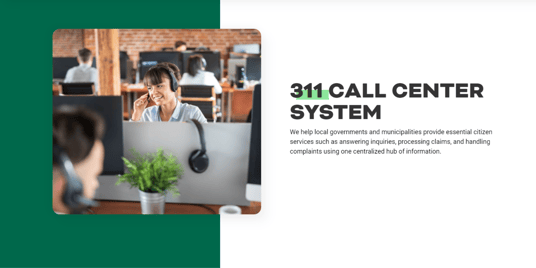The average citizen is often intimidated by the idea of interacting with government. That sense of intimidation can come from a number of different places, including prior experience, the persistent stereotype of “red tape,” expectations of painful bureaucracy, differing political views, and so on. Regardless of the rationale behind it, however, any kind of negative perception can keep residents from becoming more engaged, which in turn can lead to a larger disconnect between government officials and the very people they’re elected or hired to represent.
Fortunately, local governments are in a unique position to help overcome these potentially harmful misperceptions and change the way that residents view both the people and the processes behind their community’s governing bodies.
Here are a few tips from Katherine Glass, a veteran city clerk from Hampton, Virginia, who we spoke with in one of our recent podcast episodes:
1. Remember you’re in a government job to serve.
Working in a service industry—and, realistically, that’s what government is—can be draining. When people call you, they’re usually looking to ask for something or complain. That’s why, as Katherine Glass points out, it’s important to remember that it’s not personal.
“Be understanding,” she says. “Realize that the person didn’t pick up the phone to call and ruin your day. They’re really ticked off about the pothole that hasn’t been fixed, and maybe they should be. Maybe it slipped through the cracks, and maybe you can help fix it.”
An essential part of working in government is being prepared to meet residents’ needs with a sense of empathy. After all, you’re likely a member of their community. Answering inquiries, phone calls, and emails with patience and understanding can go a long way toward changing the way people view your organization.
2. Don’t expect that people completely understand the systems you have in place. Slow down, and explain to people why those systems are there and how they work.
Government systems and processes can feel like a language only a handful of people speak. You’re fluent because you use the language daily, but most residents do not. Unless you teach them the right ways in which to communicate, they’re going to struggle. Even worse, they’ll blame you for the disconnect.
Take the 311 system, for example. You know why it’s there, how to use it, and how much it can help residents get both prompt assistance and accountability. So why doesn’t everyone know that?
Katherine Glass thinks it’s because residents believe calling someone directly gets them faster problem resolution—which is not always the case. “What if you call and ask me something today, and then I get sick and I’m out for the next four or five days? If I haven’t passed that task off to someone, you may think I’ve forgotten you,” she explains. “But 311 offers a safety net because the call gets tracked to its conclusion in a system. It’s not staff-specific, so if the person who was handling your question isn’t handling it, then it can get reassigned.”
The moral of the story, according to Katherine, is that people don’t know what they don’t know—and it’s your job to enlighten them if you want to change misperceptions. “Sometimes things that look like bureaucracy are there so we can offer better service. And if we, as local government workers, can explain why it works that way, then people will understand. Sometimes we just need to slow down and talk to people.”
3. Give real support to the young people in your community.
Another important way local governments can start proactively projecting a positive image to the community is by capturing residents’ interest and trust at a young age. That means implementing programs that go beyond lip service to truly engage community youth.
Katherine Glass says her city—Hampton, Virginia—started an empowering youth commission years ago that’s making great strides in changing residents’ ideas about government. “It’s not just this cute little committee that we pick kids to be on, pat them on the head and say, ‘Good job,’” she explains. “They literally have a grant process, and they are the decision makers and give grants to other young people who organize and have things they want to do in the city. They don’t have tons of money, but they absolutely have control over a budget and have staff that supports them.”
Today’s youth will influence the community’s opinion of your city for years to come, so Katherine hopes her fellow clerks and municipal workers are paying attention. “If you don’t have an official way of engaging your young people in government,” she cautions, “you need to, and you need to do it quickly.”
4. Take action on diversity, equity, and inclusion.
Recent events have made it clear that local governments can’t simply talk about concerns surrounding diversity, equity, and inclusion (DEI)— they need to act. Negative perceptions are inevitable if populations within a community feel regularly underserved, underrepresented, or mistreated.
The number one thing local governments can do, believes Katherine Glass, is foster better and more transparent communication on the subject.
After her city experienced a “racially charged” incident several decades ago, officials launched the Citizens Unity Commission as a means of working through the tough emotions that surfaced. “We pulled together community leaders from different segments—faith leaders, people that were neighborhood activists, different ages, different sexes, different racial and ethnic backgrounds—for a facilitated conversation about how the community moves forward now,” she recalls.
The goal was to come together to provide the community with facts they could share within their own groups, where they already had established trust. “It may not solve the problem, but it does promote understanding of facts as opposed to conjecture,” Katherine says. “And that had value.”
Over the past 20 or so years, the Citizens Unity Commission evolved into what’s now known as Diversity College. Residents and city workers alike can sign up to attend classes at different levels, eventually becoming trainers themselves. “We hope it will become kind of self-sustaining,” says Katherine. Furthermore, the longevity of the program speaks highly of its success in strengthening interactions between residents and their government. “It’s clearly purposeful to be diverse and to promote diversity and inclusion in our community.”
5. If you want citizens to be knowledgeable about your city budget, make sure you speak in terms of value—not just dollars and sense.
Budgeting isn’t a glamorous subject. In fact, it’s one of those things that tends to infuriate residents the most. Why? Because people often want money for projects, or they believe you should be saving money on certain efforts—and when they don’t get what they want, they consider the decision either unfounded, politically motivated, or personally affronting. Of course, you know that’s rarely the case. Residents just don’t have a working knowledge of the city’s budget.
“But how do you get people interested in your budget?” asks Katherine Glass. “It’s a necessary component. You can have all the good ideas in the world, but if there’s no money to pay for them, it’s not going to happen. So having a good, healthy discussion about how you allocate your resources is critical to a successful and inclusive community.” The problem, she notes, is that “a lot of people aren’t money people,” which can make it difficult to engage them on the topic.
This is where local governments can take action to educate their residents and write a budget that better addresses resident needs. In the case of Hampton, Virginia, Katherine says things changed when the city’s budget director and council started reframing the discussion. Instead of trying to bring people to the table to talk about money, they decided to talk about what people valued.
The city launched a successful roadshow series with residents called iValue, where they heard what really mattered to people in terms of services and initiatives. “So when the city council sat down with staff to craft the budget, the budget was allocated,” she says. “And it wasn’t just a bunch of numbers. The whole document was rewritten to be like a narrative. Does it still have a budget sheet in there with addition and subtraction? Absolutely. But before that, it has a picture of a citizen explaining why this is important to them or what they feel about police and fire and parks and schools. Our whole budget is based around our community, telling us what it is they value.” Ultimately, the campaign was so successful in making the city’s budget process more citizen-friendly that the city won an award from Harvard.
6. Love your city.
Author Peter Kageyama wrote a book called For the Love of Cities, and Katherine Glass recommends it highly for her fellow city clerks and government workers. In the book, she explains, Kageyama “talks about how people generally form their opinions about where they live over the little things, not necessarily the big things, but the things that make their communities unique.”
That’s why it’s so important that city officials work to foster and share that kind of love among their residents.
Social media and city technology portals or forums are a great way to keep positive messages flowing about all the little things that inspire people within your community. If a new coffee shop or restaurant opens, for example, patronize the business and share your experience.
More importantly, applaud residents who do the same. Point out small acts of kindness or bonding experiences over high school football games or community group meetings. As Katherine states, “Government forms the rules and the backbone of our communities, but it’s the people who choose to do things and follow their passions in your city that actually make it the place you love. So anything that government can do to facilitate those efforts, I mean that’s the biggest win you can have.”
To Sum Up …
If your residents’ perception of local government is less than ideal, don’t be discouraged. There are numerous ways you can work to change both hearts and minds. The key to fostering a more optimistic view of your city’s hard workers lies in maintaining open communication, remaining patient, and ensuring that all residents feel heard by their representatives.
Taking steps now to improve your government’s reputation can go a long way toward enhancing the effectiveness of your employees and elected officials, while making every interaction more efficient along the way. Rock Solid has solutions designed to facilitate your operations and keep residents positively engaged.

